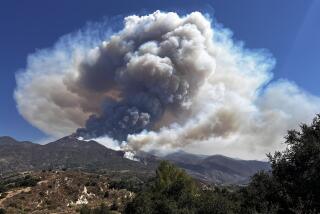Editorial: What if we can’t see the forest for the fees?
In the very near future, you may have to pay a fee to use a bathroom in one of Southern California’s four national forests. You may have to pay another fee to eat at one of the prefab picnic tables plunked next to the parking lot. You might even have to pay again to throw your trash in a garbage can. On the other hand, parking and hiking will be free.
This is the confusing and ludicrous result of a badly conceived 2004 federal law and a subsequent lawsuit challenging the parking passes that previously were required in the Angeles, Cleveland, Los Padres and San Bernardino national forests. Under the old rules, a daylong parking pass to a national forest cost $5; an annual pass allowing the purchaser unlimited entry to all four forests was $30. But last month, a judge ruled that parks could not charge those fees.
The court decision was not surprising, given that federal law specifically states that people can’t be charged for parking in national forests or for the use of basic amenities, only for “improvements.” But does that law make sense? For one thing, what’s an improvement? Campsites, obviously. But why doesn’t an information kiosk posted with trail maps and warnings count as an improvement? Or the trails themselves? Or a paved parking lot? And charging for only certain amenities is almost impossible. The forests could conceivably install pay toilets and pay trash cans, but it’s not pretty to contemplate what would happen to the forest if visitors decided to do without those.
The U.S. Forest Service has been under increasing financial strain, especially in Southern California, as the large urban populations surrounding the forests increasingly use them for recreation. Already, rangers must rely on volunteers to do too much trail maintenance and removal of invasive plants. Regional parks, state parks and national parks commonly charge for parking. And if ranger patrols are thinned or emergency response times lengthen because there isn’t enough money, the result is a more dangerous visit for everyone.
The federal law should be changed to allow reasonable parking fees, but the Forest Service also needs to meet visitors halfway. Part of the objection to the old parking passes — known as an Adventure Pass — was that visitors usually needed to purchase them at a store before heading out to the forests; there are no entry gates for fee collection. Five bucks is a bargain for a trip to the forest, less than the cost of gas to get there. If and when fees are allowed again, the Forest Service should install automated fee collection stands in the parking lots where visitors could buy a pass with cash or a credit card.
More to Read
A cure for the common opinion
Get thought-provoking perspectives with our weekly newsletter.
You may occasionally receive promotional content from the Los Angeles Times.










